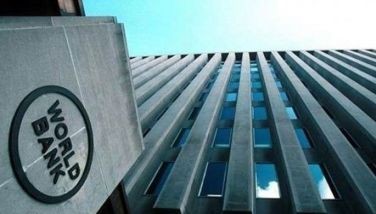Urban Bank seeks 60-day extension of SEC debt relief order
May 9, 2001 | 12:00am
Urban Bank and its investment arm Urbancorp Investments Inc. are seeking another 60-day extension of the debt relief order issued by the Securities and Exchange Commission (SEC) as negotiations for the planned takeover of the Export and Industry Bank group are still taking place.
If approved, it will be the sixth extension of the grace period that the SEC has granted to the troubled financing establishment. The last debt suspension order expired yesterday, May 8.
This developed as the Export and Industry Bank (EIB) and the National Association of Urban Bank Inc. (UBI) and Urbancorp Investments Inc. (UII) Depositors and Creditors (NAUD) presented a rehabilitation plan calling for capital infusions by the EIB and the Social Security System and conversion into equity of a portion of the bank’s deposits.
The result of all this is a new bank with a capitalization of over P5 billion, enough to qualify it for an expanded commercial bank or universal bank license.
Capital infusions will come from the EIB, P2.6-billion, and from a long-term convertible loan package from the SSS amounting to P600 million. The rehab plan also calls for the conversion to equity of deposits amounting to roughly P1.256 billion, and earnings retained by the bank amounting to approximately P1 billion.
The new bank will have a network of nearly 100 branches including various profitable properties although it will likewise inherit deposits and investments worth over P8 billion.
It is expected that many depositors and investors will be withdrawing their money upon the opening of the bank. To cope with the anticipated withdrawals, the bank had been offered a standby facility of P1.5 billion by the Philippine Deposit Insurance Corp..
The BSP has also agreed to exempt the new bank from a reserve requirement liability service plan for the next three years upon the opening of the merged bank.
It likewise agreed to enter the new bank in a rehabilitation incentive package. Some of the items listed in the package under BSP Circular 237 are: the exemption from DOSRI, SBL and other ceilings including non-allied undertakings; relocation of redundant branches; liberal LLPs establishment over time and write-offs of any goodwill; and appraisal increment up to P1-billion provided it comes from bank premises and other fixed assists including ROPOA.
EIB will also establish a unit acting as an asset management company that will concentrate on liquefying its fixed assets including One McKinley in Fort Bonifacio and Urban Plaza along Buendia Ave.
Last April 25, 2000, Urban Bank declared a bank holiday and sought refuge at the SEC and the PDIC following a massive bank run which crippled its ability to cover its deposit liabilities of more than P8 billion.
The bank’s collapse, in particular, was attributed to the anomalous and highly abnormal sale by Urban Investments to Urban Bank of P4.6 billion worth of debt papers of companies with doubtful capacities to pay, hence depleting the bank’s cash and quick assets.
Earlier, the SEC extended Urban Bank’s debt suspension after its failure to clinch an agreement with the Cojuangco-owned Bank of Commerce for a bailout deal, thus enabling Urban to consider another alternative solution to the financial crisis it currently encounters, including the search for other investors.
Last February 22, the Bank of Commerce said it was not pursuing its bid to acquire Urban Bank due to issues tied up to the legality of its closure in April last year.
If approved, it will be the sixth extension of the grace period that the SEC has granted to the troubled financing establishment. The last debt suspension order expired yesterday, May 8.
This developed as the Export and Industry Bank (EIB) and the National Association of Urban Bank Inc. (UBI) and Urbancorp Investments Inc. (UII) Depositors and Creditors (NAUD) presented a rehabilitation plan calling for capital infusions by the EIB and the Social Security System and conversion into equity of a portion of the bank’s deposits.
The result of all this is a new bank with a capitalization of over P5 billion, enough to qualify it for an expanded commercial bank or universal bank license.
Capital infusions will come from the EIB, P2.6-billion, and from a long-term convertible loan package from the SSS amounting to P600 million. The rehab plan also calls for the conversion to equity of deposits amounting to roughly P1.256 billion, and earnings retained by the bank amounting to approximately P1 billion.
The new bank will have a network of nearly 100 branches including various profitable properties although it will likewise inherit deposits and investments worth over P8 billion.
It is expected that many depositors and investors will be withdrawing their money upon the opening of the bank. To cope with the anticipated withdrawals, the bank had been offered a standby facility of P1.5 billion by the Philippine Deposit Insurance Corp..
The BSP has also agreed to exempt the new bank from a reserve requirement liability service plan for the next three years upon the opening of the merged bank.
It likewise agreed to enter the new bank in a rehabilitation incentive package. Some of the items listed in the package under BSP Circular 237 are: the exemption from DOSRI, SBL and other ceilings including non-allied undertakings; relocation of redundant branches; liberal LLPs establishment over time and write-offs of any goodwill; and appraisal increment up to P1-billion provided it comes from bank premises and other fixed assists including ROPOA.
EIB will also establish a unit acting as an asset management company that will concentrate on liquefying its fixed assets including One McKinley in Fort Bonifacio and Urban Plaza along Buendia Ave.
Last April 25, 2000, Urban Bank declared a bank holiday and sought refuge at the SEC and the PDIC following a massive bank run which crippled its ability to cover its deposit liabilities of more than P8 billion.
The bank’s collapse, in particular, was attributed to the anomalous and highly abnormal sale by Urban Investments to Urban Bank of P4.6 billion worth of debt papers of companies with doubtful capacities to pay, hence depleting the bank’s cash and quick assets.
Earlier, the SEC extended Urban Bank’s debt suspension after its failure to clinch an agreement with the Cojuangco-owned Bank of Commerce for a bailout deal, thus enabling Urban to consider another alternative solution to the financial crisis it currently encounters, including the search for other investors.
Last February 22, the Bank of Commerce said it was not pursuing its bid to acquire Urban Bank due to issues tied up to the legality of its closure in April last year.
BrandSpace Articles
<
>
- Latest
- Trending
Trending
Latest






















